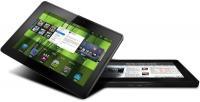
For RIM, the PlayBook seems to have turned out to be an unmitigated disaster. The sales are lacklustre. The worse thing is that even the shipments have declined by more than 50 percent. The company has recently declared that it shipped 200,000 of the tablet computers last quarter, down from 500,000 during the earlier quarter. According to one estimate, Apple sells more iPads in just two days than RIM sells in three months.
The reasons why the PlayBook is failing in the market have now become glaringly obvious. The Tablet does not have a native email system, so it can be useful only in conjunction to a BlackBerry handset tethered to it. Modern customers just dont have the time or the inclination to go through all this tethering business. The device only has 7-inch screen. This is too small. Moreover, there is the paucity of apps, which can potentially turn an imperfect hardware into a compelling proposition.
RIM cant afford to exit Tablet space
The truth is that RIM is not HP. RIM is so firmly entrenched in the consumer electronics space that it has to have a Tablet in its portfolio. A smartphone maker without a Tablet to offer would be unthinkable. The QNX Operating system, which is often touted as the companys future, runs on the Tablet. RIM has to make the operating system grow. Next year the company will be shifting its handsets over to the new software; so pulling the plug on the only mobile device that uses the software would send a wrong signal to investors and customers.
However, it is not as if the PlayBook does not have its plus points. It is lovely device, it is well made and with good specifications. It works at a fast pace and it is quite useful as a portable notepad. Once the crucial updates, that will allow the device to run all kinds of Android apps and get an email, are in place, as the RIM CEO Mike Lazaridis has assured, the PlayBook could become a really attractive proposition. A lot, however, will depend on the price.
Is fire sale the answer?
So what alternatives does RIM have? Most analysts believe that a fire sale on the lines of what HP did with its TouchPad might be the answer. There is no doubt that a fire sale could have an ugly impact on RIMs profit margins. But that is the risk that the company must take in the short term in order to secure its long-term future. HP had spared a buying frenzy for its TouchPad, when the device became available at an unsustainable price of $99.
HP sold its price at such low price because it could not afford to stay on in the Tablet market; however, in RIMs case the price will have to be lowered because the company cant afford to exit the Tablet market. Indications are that the process of finding the fire sale price point for the PlayBook has already started. A Canadian cell phone company, Rogers, has already started offering the device to its employees at 50 percent lower price.
The 16GB PlayBook, normally priced by Rogers at $499.99 Canadian or about $511 U.S., is now available to Rogers employees for just $249a 50 percent discount. The 32GB tablet is available at $349, down from $599.99, and the 64GB model can be had for $399, down from $699.99. If the device does not find enough buyers even at this price, then RIM will have to pick up a lower price point.

 In
In
Add new comment